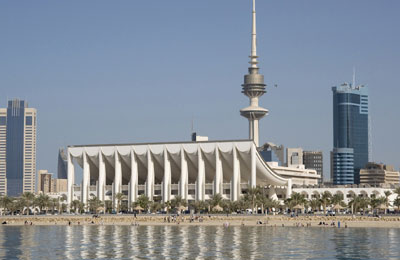
Kuwait faces deadlock after court ruling
Kuwait, September 26, 2012
By Mahmoud Harby and Sylvia Westall
Kuwait's highest court's decision against a government bid to amend electoral boundaries, leaves the cabinet without a clear option to break a parliamentary deadlock that has held up crucial economic bills.
The ruling is likely to defuse immediate tensions with the increasingly assertive opposition, which had promised to take to the streets if the court ruled in the government's favour.
But it does not solve the problem of how to establish a functioning parliament. In the last assembly, dissolved on a technicality by the Constitutional Court, Islamist and tribal candidates tried to push through Islamist legislation while clashing with the government over finance bills including a major economic development plan.
The opposition had said the government's petition to the court to change the electoral boundaries was an attempt to favour government-friendly candidates in a new election.
The court's latest ruling suggests that a new assembly, whenever it is elected, is likely to have a similar make-up to the last one, and be just as obstructive to the unelected government.
Oil-exporter Kuwait, one of the richest countries in the world per capita, has a relatively open political system and has avoided the uprisings seen elsewhere in the Arab world.
While parliamentary approval is needed for major bills and the budget, the monarchy retains a firm grip on the main government portfolios, and political parties are banned.
There was no immediate reaction to the ruling from the government, but Islamists were quick to welcome it.
"The constitutional ruling today means that the government should resign immediately," Islamist MP Faisal al-Muslem wrote on Twitter, calling for new parliamentary elections.
"TRIUMPH"
"This is a triumph of the will of the nation," Islamist MP Waleed al-Tabtabie told almost a quarter of a million Twitter followers.
The Constitutional Court angered protesters with a separate ruling earlier this year when it effectively dissolved the opposition-dominated parliament elected in February.
The old, more government-friendly assembly that it reinstated has been unable to meet due to a boycott by MPs. Analysts say this means another dissolution is likely, with a new election this year or next.
The government had said it needed the Constitutional Court to rule on the electoral law to protect future elections from legal challenges. But the court declined to rule, saying it did not have the authority to dictate electoral boundaries.
The decision puts pressure on the government but also on the opposition, said Kristian Ulrichsen, research fellow on Gulf States at the London School of Economics.
"They will need to show the electorate that they have a viable way out of the impasse, rather than the rash of populist initiatives they focused on in the last parliament," he said.
During their few months in power before parliament was dissolved, members of the opposition tried to push through legislation such as introducing the death penalty for blasphemy and making all legislation comply with Islamic law.
Emir Sheikh Sabah al-Ahmad Al-Sabah, who has the final say in political matters, blocked the bids, according to MPs.
But the political infighting has threatened the timetable of a 30 billion dinar ($107 billion) economic development plan, which includes major infrastructure projects intended to draw in foreign investment. - <!--Reuters-->







